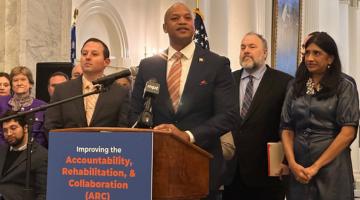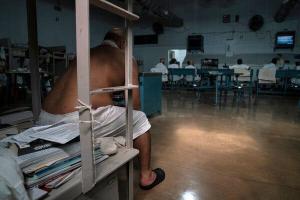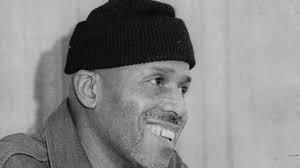Vigil for the Victims of the Alabama Department of Corrections on March 7, 2023, at Dexter Avenue King Memorial Baptist Church, in Montgomery. Nearly 300 people died in Alabama's prisons this past year. (AP Photo/Julie Bennett)
In Alabama Covid funds are used for prison construction, opportunities for the incarcerated to be released have been eliminated, and violence is rampant. Alabama makes the case for prison abolition.
Originally published in Scalawag.
Scalawag Editor's note: This essay is a detailed, first-hand account of the present conditions of Alabama prisons from the perspective of a currently incarcerated individual. This account is written against the backdrop of the Alabama Department of Corrections (ADOC) upcoming trial, which stems from the federal lawsuit filed in response to the unconstitutional conditions found in the 2020 DOJ investigation of the state's men's prisons.
These findings, which allege ADOC has failed to protect incarcerated folks from inmate-on-inmate violence, sexual abuse, and excessive use of force from prison staff and to provide safe conditions of confinement, support the narratives and actions from the inside that have become the target of state repression.
In the wake of a 2022 prison strike, Governor Kay Ivey signed a reform polic(e)y in which measures to standardize the state's "good time" polic(e)y that has, among other things, standardized the definitions of low, moderate and high-level offenses and disqualified even more prisoners from opportunities for sentence reduction as a reward for "good behavior." Under this executive order, what the state deems "encouraging or causing work stoppage" and "failure to obey a direct order of an ADOC employee" now qualify as high-level offenses.
In addition, the governor is pursuing the construction of two 4,000-bed mega prisons to replace the facilities that state investigations have deemed beyond repair. Ivey has recently requested the addition of state education surplus funds, to the existing $1.3 billion already allocated to the construction budget—$400 million of which include federal COVID-19 relief funds. The testimony here joins the voices of dissent that have been blowing the whistle on the conditions in Alabama prisons and its larger carceral apparatus which boasts deteriorating physical conditions, along with the near-complete decay of its parole, health care, and other "justice"-serving infrastructures. Kriston Dowdell's account, when combined with the long history of struggle against the brutality of the Alabama carceral state, makes a far more than sufficient case for the abolition of the entire apparatus.
I am a first-timer in prison. I know you hear a lot about the prisons from people outside—the general public, lawmakers, etc.—but this is the true version, straight from the inside. We can't be silenced anymore. We have to take action and make a change.
INFRASTRUCTURE
Alabama prison facilities are really, really old and lack adequate space to hold the crowds of new inmates that are coming in today. This is because they were built at a time when prisons were designed to hold inmates for short periods of time, as these people were only meant to be contained until they were rehabilitated. At some point, the focus shifted from rehabilitation to simply housing inmates. In other words, the new objective of the Alabama prison system is to hold them in prison as long as possible and find new ways to make money off of them at the same time.
Prisons in this state are often built in communities where they hire a lot of local workers, who survive off of the prison at the expense of the inmates, because it is the only job around. The Alabama Department of Corrections (ADOC) leverages the money and legal orders thrown at them from "successful" prison reform policies to hire more correction officers, yet when they do, the new COs don't stay long. When they see the long hours, short pay, and the risk to themselves, they get out quick; trust me, I've seen plenty come and go. The true question is, how can the state build a supermax prison in Alabama, without first securing sufficient staff to run it? The Alabama Department of Corrections has no foundation, so why waste money you don't have?
FOOD
The food in Alabama prisons is both terrible and served in such small portions, I wonder whether or not the state thinks it's serving elementary school children, as these rations are not enough to feed a grown man. I often see inmates with no money trying to go back for seconds because they are hungry and can't afford to buy food from the commissary store. They get thrown out of the kitchen and sometimes get hit by the officers or fellow inmates. I have personally had a dinner tray slapped out of my hand for trying to take an additional serving and was punished by not being allowed to eat anything that night.
Any extra food that is left over after feeding us is either thrown away or sold by the inmates who work in the kitchen. These inmates are not paid money for their work, so they sell food out of the kitchen instead. It's basically stealing, but you can't blame them. They work for free.
DRUGS
I have witnessed many things in my life, but baby they don't got nothing on the state of Alabama prisons! If you took a poll I'm sure you'd find that a majority of people would say that they have experimented with drugs on the street, but I have also seen many others come to prison healthy and drug-free. They get on drugs while inside and literally shrivel up. I watch their faces sink into their bones. I feel bad for them. They are desperate and will do pretty much anything to get high.
A lot of these inmates are considered homeless in prison, meaning they don't have anyone to send them money to buy hygiene products and other basic necessities. They sleep on the floor or a bed with no mat or cushion, don't bathe more than once a week maybe, and they are on drugs all the time.
The drugs don't come in on their own. We've all seen the movies where the officers bring the product in, then the inmates chop it up and sell it. Well, some movies actually tell the truth. I have never seen so many drugs flowing freely, and the overdoses, which have gotten so frequent that the Alabama Department of Corrections has officially stopped reporting inmate deaths, are evidence that the "drug crisis" does not stop at prison walls. It's now up to a different agency to give the outside world an accurate death count.
In the event of an overdose, the inmates are responsible for rescuing each other. They have to run and get the stretcher, pull the person experiencing the overdose out of bed, and run them to health care. They have to do this, as most are not breathing and have to be brought back to life with a Narcan shot. This cycle continues as drugs are a big money-maker for the inmates and the officers who participate.
VIOLENCE
The level of violence here in Alabama prisons is ridiculous.
I have witnessed many violent incidents since my prison experience began. My first encounter with violence on the inside was prior to my stay in the actual prison. In the county jail, the guy in the cell next to me hung himself. No one believed me until the incident made it onto the evening news. After entering prison, I witnessed a man be stabbed in the eye socket with an ice pick by an inmate who was high on drugs. The victim died. I saw the stretcher they carried him soaked and pooled with human blood. So many people die here that it is common to have a conversation and someone say, "Oh, did you hear? So and so died last night? He was killed."
The cycle of violence starts with drug use. Inmates buy drugs, can't pay their debts back, and they are beat up, raped, or even killed. Some take illegal drugs that are mind altering, and they have violent reactions toward other inmates. The officers are supposed to protect us, right? Wrong. If you are attacked or think you could be attacked by another inmate, don't wait for an officer to arrive. You'll be dead by then.
It's best to be prepared, get a knife or ice pick, and keep it on you. With the staff shortages they are having, now they stretch out the officers they have got. The COs work long hours, and sometimes one officer is tasked with watching over two whole dorms with an average 248 inmates in each dorm. On the higher end, overcrowded dorms reach as high as 320 inmates in a dorm, a number that is approved despite the prison employing only handful of officers in the entire facility on some days and nights. This not only puts inmates and staff in danger, but it also causes health care and nursing staff to have lots of turnover.
Alabama has a bad track record of caring for mental health patients, so for decades they have been sending the "mentally ill" to prison. Here, patients are subject to care under ADOC, where the facilities have limited resources available to help and the inmate-patients are left in the care of officers, who are untrained in the field of mental health. They only know how to use brute force to get the inmates in line.
FEDERAL LAWSUITS
For years, we inmates would run to the TV every time we heard the Alabama state legislature was going to hold a special session regarding prison conditions. Of course these sessions would go absolutely nowhere because Alabama does not wish to rehabilitate and let their inmates go; their goal remains to make money off of every inmate for as long as possible.
This is evident in the case of the Alabama parole board. At present, the number of people getting paroled out any more has dwindled significantly. If 100 people go up for parole, only five might make it out. The Alabama prison system is set up like a hotel chain: it only makes money when the rooms are booked, and profits are best when it is filled to capacity; If it is empty, then it's not making any money. The federal government has been going back and forth with the state of Alabama for years, threatening lawsuits, giving ultimatums.
Despite these horrific conditions, Governor Kay Ivey is hell-bent on building two supermax prisons in Alabama. That would be her legacy. If successful, the state will try to fill these facilities up just as quickly, which will only produce the same problems over and over again. The governor tried to use funds diverted from the Federal Stimulus money given to the State to fight coronavirus to build these new prisons. This is just wrong.
Finally, the Department of Justice sent some people, "representatives," down to the Alabama prisons to take a look around, and to personally talk to the inmates face-to-face, one-on-one, without being afraid. Hopefully, this will help out in their lawsuit against the Alabama Department of Corrections, because it is hopeless down here. There needs to be a national spotlight put on what is going on in the prison system here in this state.
Kriston Dowdell is a writer currently incarcerated in an Alabama prison.



















